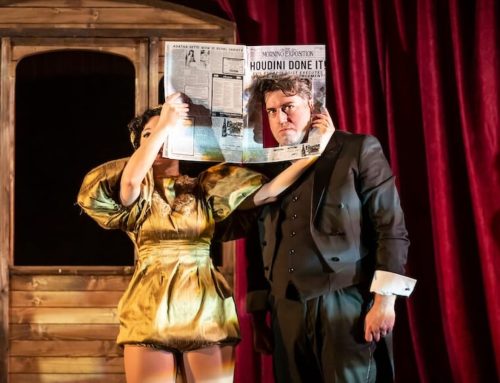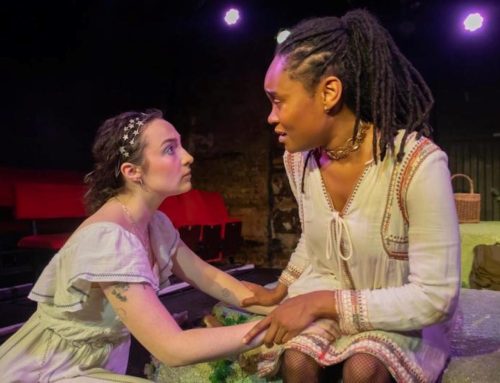Catherine “Kitty” Wilkinson (Samantha Alton), the eponymous protagonist of John Maguire’s solidly watchable bioplay Kitty: Queen of the Washhouse appears at the show’s outset fully bedecked in costume and make-up of marble white. It is an appropriately ethereal choice for a stone statue come to life, which is how Maguire envisages her character, but also for a play much concerned with the ghosts of a city’s past.
Kitty Wilkinson’s life as an Irish immigrant to Liverpool in the early 19th century is one of pain. She loses father, baby sister, and later a husband to drowning. She loses her mother to a slow and brutal form of dementia. For a time, she is indentured to a mill-owner, working 14 hours a day, 6 days a week. Later she collects and sells horse manure as her family’s only means of survival.
But Kitty’s life is also one of great service to her community. She fosters 42 children, opens schools, introduces her neighbours to life-saving theories of cleanliness, and most notably pushes for the establishment of public baths where the poor of Liverpool can bathe. Arguably, her actions directly save dozens from a cholera epidemic. They set the scene for the opening of washhouses across the country that probably save many hundreds more. Queen Victoria presents her with a silver teapot in recognition of her services. In Maguire’s Kitty: Queen of the Washhouse it is the ghosts of the poor and downtrodden that Kitty saves that talk loudest and brightest.
It is a tough ask for any writer to tell the complex life story of a little known character in a 50-minute, single-hander. There are elements in the production that feel out of place. The shipwreck and drownings that mark the young Kitty’s arrival in Liverpool are told through cardboard cut-outs in a 3d lightbox. It is a choice of stagecraft that somehow seems hackneyed.
Ultimately what makes the show worthy of attention is the engrossing and skilled performance by Alton. The Liverpool-based actor plays Kitty as a kind of unstoppable force of nature. She is always on the move – constantly feeding babies, cooking, scrubbing floors, washing clothes, folding linen again and again into ever smaller bundles. The performance adds momentum to what might otherwise be a dry if worthwhile piece of educational herstory. There is much in Kitty’s life that is worthy of Dickens, from her adoption by a blind benefactress named Mrs Lightbody, to the ever-present shadow of “the bulky bullying workhouse”. Alton does her memory credit.
Writer: John Maguire
Director: Margaret Connell
More Recent Reviews
Playfight. Soho Theatre.
Writer Julia Grogan’s breathtakingly assured debut play arrives at Soho Theatre following stellar reviews at the Edinburgh Fringe and [...]
All The Happy Things. Soho Theatre.
Naomi Denny’s three-hander comedy-drama All The Happy Things covers familiar themes within a recognisable premise. A grieving protagonist comes [...]
Telly. Bread and Roses Theatre.
The challenge with absurdist comedy is that many people do not find it funny. Laughing at the sheer weirdness [...]






